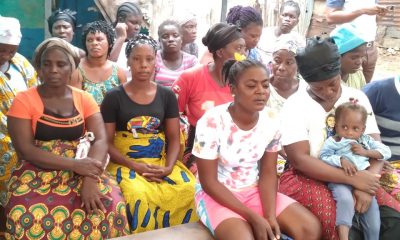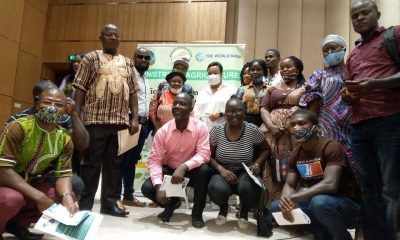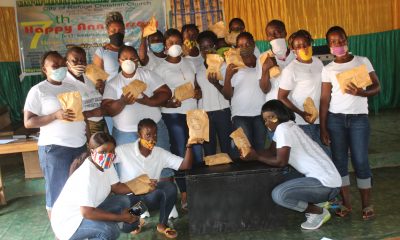
Monrovia – Liberia’s restaurant industry is faced with the challenge of remaining sustainable, as the coronavirus pandemic has constrained the government to keep in place certain regulations to contain the spread of the virus.
Report By: M.Dennise Nimpson, LMD Responsible Health Reporting Fellow
Owners of restaurants have complained that they are not generating enough income, due to a huge dip in the number of customers.
Despite the government officially lifting the State of Emergency on July 21, there are still other regulations that seem to be impacting the number of customers for the hospitality industry.
Most businesspeople had thought that relaxing the restrictions and reopening the country would spur economic activities and positively impact businesses, but those in the hospitality industry say there has been no improvement.
Amin Modad is a Liberian business executive who owns several businesses in the country, including the Bella Cassa hotel, a restaurant, and beach resort. Modad says that, since COVID-19 began spread in Liberia, customers have drastically dropped – something that is seriously hampering business.
He noted that the number of customers his hotel recorded prior to the pandemic can no longer be seen at his restaurant, because many people are now afraid to eat at restaurants, for fear of contracting COVID-19.
“The devastation and the impact on every sector is worse than even during the Ebola epidemic,” says Modad. “This is a game changer not only locally, but changes how the world does business.”
Mr. Modad is also worried that the prices of food have tremendously increased, due to several factors created by the pandemic.
“There’s a drastic change in travel. It is sad that Liberians themselves do not have purchasing power to really patronize big hotels and restaurants. If you look globally, most of the big hotels and hospitality institutions across the world are not really targeting domestic markets,” said Modad, who disclosed that the situation has constrained him to reduce the price for rooms at his hotel. He said access to local and imported supplies are also a challenge for the industry.
“Everything’s prices have gone up significantly; whether it is locally produced agriculture items or foodstuffs [that are] imported, we have seen tremendous increase in prices, notwithstanding shortages in some of things that we expect on the market.”
According to him, the businesses cannot close their doors because it will create hardship for the families of thousands of Liberians who are employed within the sector, and undermine the gains Liberian entrepreneurs have made over the last decade.
“Some of us are at a stage where it becomes our pride to survive. We have been competing with our foreign counterparts all these years, and our doors are open not because we made the money but I think we serve as inspiration to other Liberian businesses, young Liberian entrepreneurs. For some of those reasons [we must remain open], whether business is good or not,” he said.

Bella Casa, located in Sinkor, Monrovia, is a major hotel in Liberia hospitality industrial. It has struggled since the COVID-19 outbreak in Liberia
Meanwhile, while it appears that the government is struggling to enforce the health protocols intended to curb the spread of COVID-19, it has, however, warned that businesses breaching the regulations will face punitive action.
This is a situation that is scaring restaurants to fully reopen to the public, amid the already present fear by customers that the threat of the COVID-19 continues to lurk.
Dr. Mosoka Fallah, Director General of the National Public Health Institute of Liberia, recently said that “modalities have been worked on” to ensure that violators of the health protocols will be arrested and fined.
“What we are trying to do now is to work with the Ministry of Health to develop public health regulations – like the bank, we will go there and if someone is without mask, we will fine you and when we fine you, the place will be closed for you to pay”.
“Those that will be inside cars without nose mask would also be fined. COVID-19 is real, let’s keep safe. Even cars [may] be impounded,” Dr. Fallah adds.
As for his own business, Modad stresses that the safety of his employees is his foremost priority, as they reinforce regular hygiene practices among staff at the hotel.
“What we’ve done as a hospitality sector is that we have reinforced the regular good hygienic practices. All hotels or restaurants on normal circumstances must conform to certain safety measures – we have always met the test,” he said.
“All our staff in the kitchen use gloves. Wven where they cannot use gloves, we have heightened the usage of alcohol [cleaners] and sanitizer; we have these positioned at every entry point, even in our kitchen, and mask wearing is enforced.”
According to him, cutting down of staff has also formed part of the measures put into place to avoid customers and staff coming in close contact, while customers have been encouraged to take away their orders as a means of decongesting the restaurant, he said.
“Because of the lack of patronage, we still have to maintain staff, so we have to cut back on some of the staff to manage our expenses. It is not only Bella Cassa Hotel – all sectors of the hospitality industry are affected; some people’s situation is worse.”

Many small restaurants have also been hit hard by the pandemic , their number customers has reduce d | Photo By: M.Dennise Nimpson
Konia Myers, owner of Prudent Bar and Restaurant in Central Monrovia, is also feeling the brunt of the pandemic’s impact on the local hospitality sector.
Myers says that, since the outbreak, she has been operating without profit – something she explains is dangerous to the sustainability to of the business.
“Since the coronavirus, prices of things have increased, the market is hard and my customers are not coming like they used to,” she said.
She said access to food supplies is challenging because the prices of goods, including bags of rice have increased.
Although Myers is committed to ensuring that her customers follow the health regulations by washing their hands, her low profit is making it difficult for her to regularly purchase detergent.
Another owner of a well-known restaurant in Monrovia who asked not to be named because of her business ties with some government officials, said she is struggling to keep her business afloat due to the bad business climate.
“Before coronavirus I used to cook two times a day – but now only one time, because my customers have dropped. We even buying half bag of rice for more than three thousand, when it used to be thousand plus Liberian Dollars,” she said.
“Coronavirus [has] really crippled us; we pray to God for it to go away because things are too complicated in terms of our business transactions.
“Some of us, who are in susu [daily savings] is another problem for us,” she added, “because to get the susu money after selling and put your profit one side is difficult. Now business is from hand to mouth.”
Local Voices Liberia is a network of dedicated Liberian journalists based in the 15 counties working to lift the development concerns and progress of rural communities.


Methodology

True
The claim is rigorous and the content is demonstrably true.

Half True
The statement is correct, although it needs clarification additional information or context.

Unproven
Evidence publicly available neither proves nor disproves the claim. More research is needed.

Misleading
The statement contains correct data, but ignores very important elements or is mixed with incorrect data giving a different, inaccurate or false impression.

False
The claim is inaccurate according to the best evidence publicly available at this time.

Retraction
Upon further investigation of the claim, a different conclusion was determined leading to the removal of the initial determination.

Toxic
A rude, disrespectful, or unreasonable comment that is somewhat likely to make you leave a discussion or give up on sharing your perspective. Based on algorithmic detection of issues around toxicity, obscenity, threats, insults, and hate speech;
































































































































































































































































































































































































































































































































































































